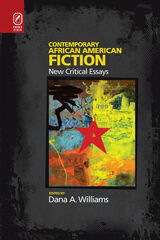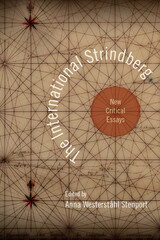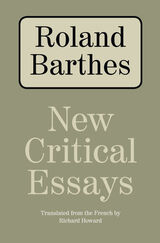4 books about New Critical Essays

The Art of Nick Cave
New Critical Essays
Edited by John H. Baker
Intellect Books, 2013
Known for his work as a performer and songwriter with the Birthday Party, the Bad Seeds and Grinderman, Australian artist Nick Cave has also pursued a variety of other projects, including writing and acting. Covering the full range of Cave’s creative endeavors, this collection of critical essays provides a comprehensive overview of his multifaceted career.
The contributors, who hail from an array of disciplines, consider Cave’s work from many different angles, drawing on historical, psychological, pedagogical, and generic perspectives. Illuminating the remarkable scope of Cave’s achievements, they explore his career as a composer of film scores, scriptwriter, and performer, most strikingly in Ghosts of the Civil Dead; his work in theater; and his literary output, which includes the novels And the Ass Saw the Angel and The Death of Bunny Munro, as well as two collections of prose. Together, the resulting essays provide a lucid overview of Nick Cave’s work that will orient students and fans while offering fresh insights sure to deepen even expert perspectives.
[more]

Contemporary African American Fiction
New Critical Essays
Dana A. Williams
The Ohio State University Press, 2009
In Contemporary African American Fiction: New Critical Essays, edited by Dana A. Williams, eight contributors examine trends and ideas which characterize African American fiction since 1970. They investigate many of the key inquiries which inform discussions about the condition of contemporary African American fiction. The range of queries is wide and varied. How does African American fiction represent the changing times in America and the world? How are these changes reflected in narrative strategies or in narrative content? How do contemporary fictionists engage diasporic Africanisms, or how do they renegotiate Americanism? What is the impact of cultural production, gender, sexuality, nationality, and ethnicity on this fiction? How does contemporary African American fiction reconstruct or rewrite earlier “classic” African American, American, or world literature? Authors under study include Ernest J. Gaines, Ishmael Reed, Edwidge Danticat, Octavia E. Butler, Olympia Vernon, Toni Morrison, and Reginald McKnight, among others.
These essays remind us that the African American literary tradition is about survival and liberation. The tradition is similarly about probing, challenging, changing, and redirecting accepted ways of thinking to ensure the wellness and the freedom of its community cohorts. The essays identify new ways contemporary African American fiction continues the tradition’s liberatory inclinations—they interrogate the ways in which antecedent texts and traditions influence contemporary texts to create new traditions.
[more]

The International Strindberg
New Critical Essays
Anna Westerståhl Stenport
Northwestern University Press, 2012
This fine collection of essays offers a wide range of new and original perspectives on Strindberg and his relation to modern and contemporary literature. By using Strindberg as a fulcrum or spring board, the volume opens a unique and unusual historical perspective on Europe and European literature. One of the important values of The International Strindberg is that it will appeal to a variety of readers, since the essays cover such a diverse range of approaches. The introduction is particularly impressive because it both sets up the value of looking at Strindberg from a twenty-first century perspective and suggests how that can and should be done. The volume demonstrates the variety of ways in which Strindberg’s work can be seen and discussed in light of twentieth and even twenty-first century literature.
[more]

New Critical Essays
Roland Barthes
Northwestern University Press, 2009
New Critical gathers Roland Barthes's essays on classic texts of French literature, works by La Rochefoucauld, Chateaubriand, Proust, Flaubert, Fromentin, and Lori. Like an artist sketching, Barthes in these essays is working out the more fascinating details of his larger theories.
In the innocuously names "Proust and Names" and "Flaubert and Sentences," Barthes explores the relation of the author to writing that begins his transition to his later thought. In his studies of La Rochefoucauld's maxims and the illustrative plates of the Encyclopedia, Barthes reveals new vistas on common cultural artifacts, while "Where to Begin?" offers a glimpse into his own analytical processes. The concluding essays on Fromentin and Loti show the breadth of Barthes's inquiry. As a whole, the essays demonstrate both the acuity and freshness of Barthes's critical mind and the gracefulness of his own use of language.
[more]
READERS
Browse our collection.
PUBLISHERS
See BiblioVault's publisher services.
STUDENT SERVICES
Files for college accessibility offices.
UChicago Accessibility Resources
home | accessibility | search | about | contact us
BiblioVault ® 2001 - 2024
The University of Chicago Press









